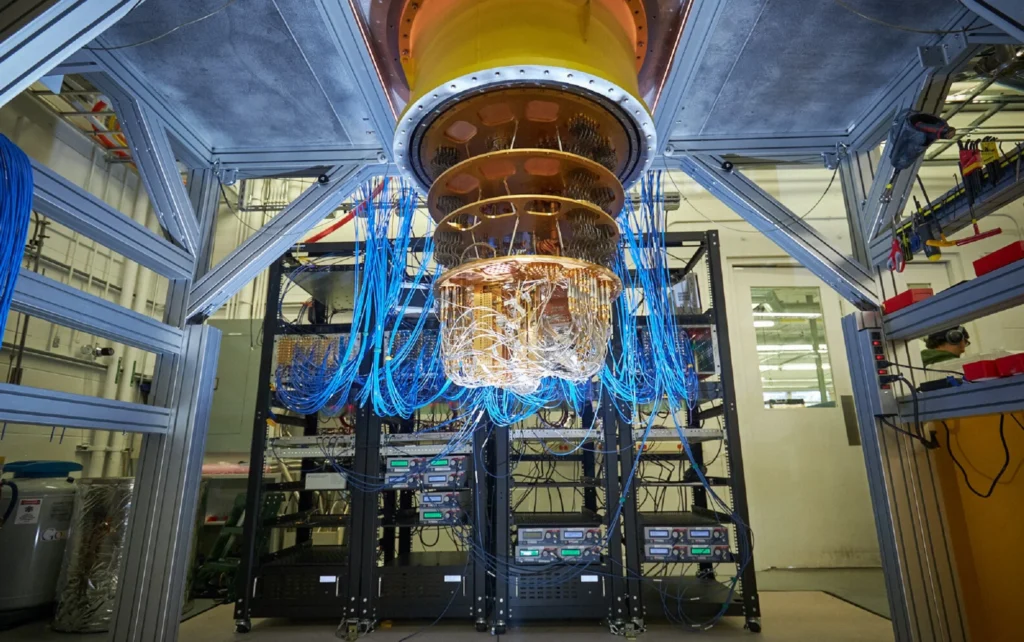Quick Summary
- At the core of quantum computing are quantum bits, or qubits, which differ from classical bits in their ability to exist in multiple states simultaneously through a phenomenon known as superposition.
- Quantum computing, however, uses the principles of quantum mechanics to process information in a fundamentally different way.
- Quantum computing offers a tantalizing glimpse into the future of computing power, with the potential to solve some of humanity’s most complex problems.
Quantum computing represents one of the most intriguing frontiers in technology, promising to revolutionize the way we process information by leveraging the peculiar principles of quantum mechanics. This article delves into the heart of quantum computing, exploring its fundamentals, comparing it with classical computing, and pondering its potential implications for the future.
Chapter 1: The Quantum Leap – Understanding the Basics
Quantum computing is a complex and often bewildering field, fundamentally different from classical computing based on binary systems. At the core of quantum computing are quantum bits, or qubits, which differ from classical bits in their ability to exist in multiple states simultaneously through a phenomenon known as superposition. Additionally, qubits can be entangled, meaning the state of one qubit can be dependent on the state of another, regardless of the distance between them.
Key Concepts:
- Superposition: Allows qubits to represent both 0 and 1 at the same time.
- Entanglement: A unique quantum property where qubits become interconnected and the state of one can instantly affect another.
- Quantum Interference: A method for manipulating the probability amplitudes of qubits to achieve the desired computation.
Chapter 2: From Classical to Quantum – A Comparison
Classical computers, which encompass everything from the earliest room-sized mainframes to modern smartphones, operate using binary digits (bits) that can either be a 0 or a 1. These bits are the fundamental building blocks of classical computation, allowing for the processing and storage of data.
Quantum computing, however, uses the principles of quantum mechanics to process information in a fundamentally different way. The multidimensional nature of qubits allows quantum computers to process a vast amount of possibilities simultaneously.
Comparison:
- Processing: Classical computers process one binary operation at a time, while quantum computers can evaluate multiple possibilities at once.
- Speed: Quantum computers have the potential to perform certain computations much faster than classical computers.
- Complexity: Problems that are intractable for classical computers, like factoring large numbers, can potentially be solved by quantum computers in a fraction of the time.
Chapter 3: The Current State of Quantum Computing
As of 2023, quantum computing is in a nascent stage. Researchers and companies around the globe are racing to build more reliable and powerful quantum computers. Current quantum computers are prone to errors and require extremely low temperatures to operate, as qubits are highly susceptible to interference from their environment.
Milestones:
- Quantum Supremacy: Achieved when a quantum computer can perform a calculation that is impractical for classical computers.
- Error Correction: Developing methods for quantum error correction to create more stable qubits is a significant focus area.
- Scalability: Making quantum computers that can handle a large number of qubits effectively.
Chapter 4: The Potential Impact of Quantum Computing
The promise of quantum computing is vast, with potential impacts across various fields. It could transform cryptography, materials science, pharmaceuticals, and optimization problems, among others.
Areas of Impact:
- Cryptography: Quantum computers could break many of the cryptographic systems currently in use.
- Drug Discovery: They can simulate molecular interactions at a granular level, potentially speeding up the development of new medicines.
- Material Science: They may discover new materials by accurately simulating molecular compositions.
- Complex Systems: Quantum computers could optimize complex systems in logistics, finance, and AI more efficiently than classical computers.
Chapter 5: Preparing for a Quantum Future
As quantum computing continues to develop, it is crucial for industries to prepare for the quantum future. This involves investing in research, developing new algorithms, and considering the security implications of quantum-resistant encryption.
Steps Towards Adoption:
- Education and Workforce: Developing a workforce educated in quantum computing is vital.
- Investment in Research: Continued investment in quantum computing research and development is crucial for advancement.
- Quantum-secure Cryptography: Updating current cryptographic methods to be secure against quantum attacks.
Conclusion
Quantum computing offers a tantalizing glimpse into the future of computing power, with the potential to solve some of humanity’s most complex problems. While it is still in its early stages, the progress in this field is rapid. Understanding the basics, acknowledging the current challenges, and preparing for its vast potential will help us harness this technology for the betterment of society. As we continue to unravel the mysteries of quantum mechanics, we edge closer to a future where quantum computing could redefine the landscape of computational power.


